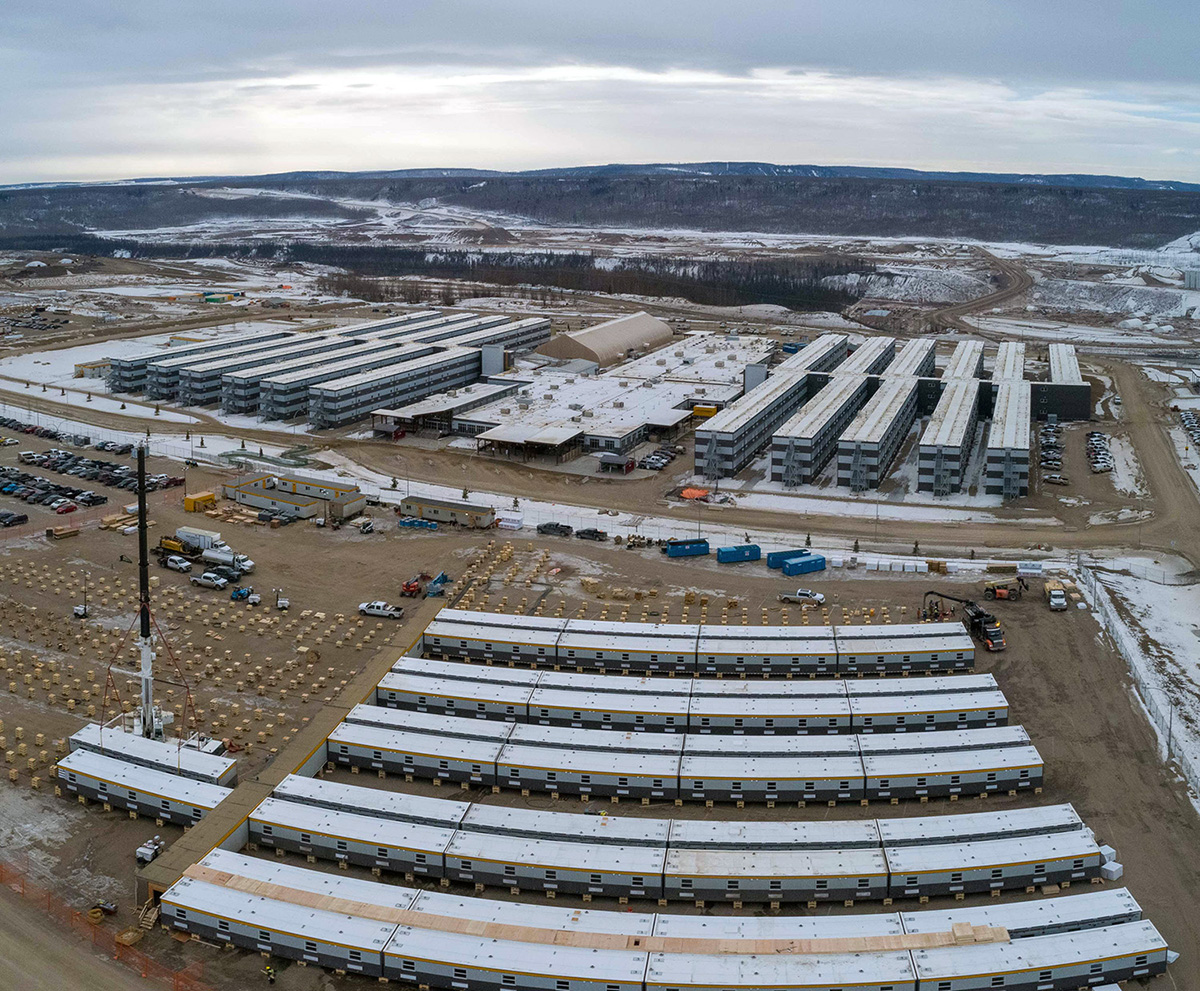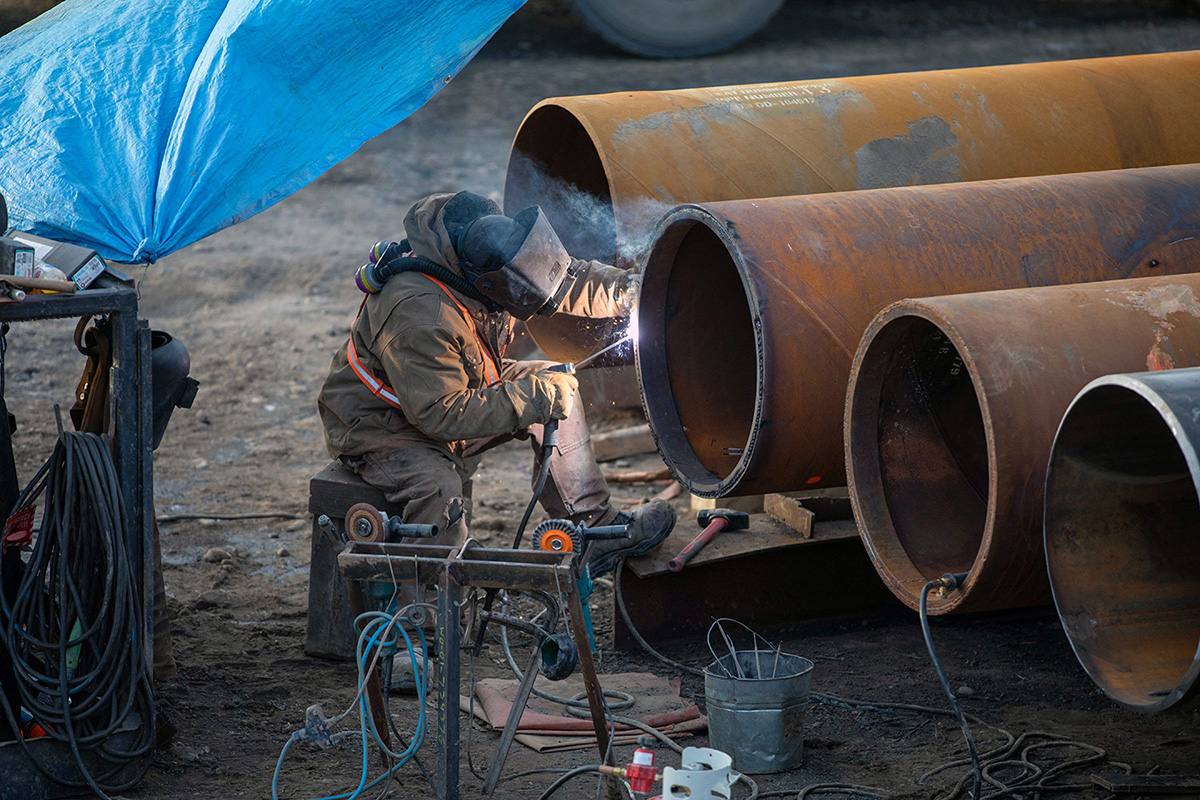Every other week, Susan’s husband leaves their home outside Vancouver and drives to YVR.
From there he takes two flights and a bus to a work camp north of Fort McMurray, Alberta. For 12 hours a day he repairs mining vehicles in the oilsands. When he’s not on the job, he lives in camp with hundreds of other workers.
“He and I have both been horribly worried about his health, the possibility of spreading to others in case he might be carrying it and the concern of him getting it from travelling and being in camp,” she says. “Yet he has not been laid off, and he can’t stop going for fear we will not be able to afford our bills and put food on our table.”
Some workers — The Tyee has agreed to keep their identities confidential — say they’re struggling to decide whether to stay home and lose their income, or risk contracting or spreading COVID-19.
Work on large industrial projects has been deemed an essential service during the pandemic. In B.C., that means projects across the province’s north are continuing despite the risk that COVID-19 outbreaks could overwhelm health-care centres.
Many workers travel long distances for their jobs, where they live in camps with hundreds of other workers.
“I am concerned for his health and well-being while having to travel and be in a camp with others,” said Susan. “It’s been difficult for me to be home alone while he is at work during normal times; now it’s that much harder worrying about whether he might get sick or bring it home.”
The decision to quit or continue working isn’t simple.
People who abandon their jobs are unlikely to qualify for financial assistance.
The federal government rolled out the Canadian Emergency Response Benefit last Monday, providing temporary income to those who have lost jobs due to COVID-19. By Tuesday afternoon, more than 1.5 million Canadians had applied. That’s in addition to millions who claimed employment insurance benefits within the last month.
The program’s benefits — $500 a week for up to 16 weeks — are available for those “who have stopped working because of COVID-19 and have not voluntarily quit their job or are eligible for EI regular or sickness benefits.”
For someone being paid $125,000 a year, that’s a big cut in income.
And some workers wonder whether deciding to stay home in the face of a pandemic will mean they “voluntarily quit their job” and lose the chance to receive emergency benefits.
“I do not think you can ask to be laid off. I was only aware you could refuse to work, using up holiday pay — but then what?” says John, who works three-week rotations at a mine in northern B.C. While he’s happy to be employed, he worries about older workers and those with compromised health.
He says some workers have been using vacation time and, in some cases, have been able to take a short-term disability leave. Otherwise, it’s business as usual.
“Being middle age, I may be less symptomatic, therefore once home I will be in complete isolation now... I cannot guarantee I could not be infected,” he says.
The province’s list of essential services during the COVID-19 crisis is different than those designated under the Labour Relations Code, which ensure the health and safety of British Columbians is protected in the event of labour disputes.
The current list, which was developed by Emergency Management BC and is regularly updated, defines essential services as “daily services essential to preserving life, health, public safety and basic societal functioning.” It includes mining, oil and gas infrastructure and construction work.
While businesses across the country have shut down to reduce the virus’s spread and gatherings are reduced to fewer than 50 people — B.C provincial health officer Dr. Bonnie Henry has encouraged restricting gatherings to only a few people — concerns have been raised about large industrial projects continuing. The 50-person rule does not apply to construction sites.
Some projects, such as the Site C hydroelectric dam near Fort St. John and Kitimat’s LNG Canada terminal say they have scaled back their workforce, although camps for both projects continue to host hundreds of workers.
The CBC reported Wednesday that Site C was host to almost 1,000 workers, including “hundreds” flown in over the past couple of weeks. Ten were reported to be in isolation with COVID-19 symptoms.
Asked whether Site C workers were given the option to leave their jobs, David Conway, community relations manager with the project, said most of the hiring for the project is done by contractors and each would address employee requests on a case-by-case basis.
“Most Site C contractors have advised BC Hydro that there will be no repercussions for individuals who do not wish to return to work, out of concern for the current COVID-19 situation,” he said.
Employees would need to speak directly with their employer and government agencies to see if they would qualify for financial assistance, he said.
According to Mathews Dinsdale LLP, a Canadian law firm specializing in labour and employment, employees may be able to refuse to go to work or perform certain duties if their work environment is deemed unsafe. During the pandemic, that could include a confirmed case of COVID-19 in the workplace, concerns due to age or underlying medical conditions, or unsafe conditions while travelling to work.
Paul McLean, a Vancouver-based partner with the firm, says the definition of risk would depend on the nature of the job.
“If you’re a fireman, you can’t refuse to run into a burning building because it’s unsafe,” McLean said, noting that what defines an unsafe work environment is rapidly changing in the face of COVID-19. “It’s obviously a very different circumstance if I’m a nurse or a doctor right now than if I’m working on a construction site 300 kilometres north of Prince George. It becomes a real challenge for employers and employees to identify with clarity what a precise work refusal situation might be.”
In recent weeks, B.C.’s public health officer has released COVID-19 guidelines for a variety of industries deemed essential during the pandemic, including construction sites. They include increased handwashing and sanitation, two-metre distancing “where possible” and isolating employees who display symptoms of COVID-19.
In order for a worksite to be considered unsafe, an employee would need to prove their employer isn’t following those guidelines.
“If the answer is yes, all those steps have been taken, then chances are you’re going to be required to go to work,” McLean says.
On April 2 the province announced that essential service providers would not be held liable for “damages caused by exposure to COVID-19 while continuing to operate, so long as they are complying with orders from the provincial health officer and other authorities.”

A news release from the Ministry of the Attorney General said the order was introduced to ensure business owners would be covered by insurance during the pandemic and only those “who are grossly negligent” would be held liable for damages.
“The government, for now, has identified the COVID-19 essential services, which can include critical infrastructure and certain other projects, like industry, manufacturing, mining and smelting operations — they’re all still churning away, and I think that’s a recognition that so long as work can be performed safely, there’s probably a need to keep that work going,” McLean said.
McLean said travelling to a job site presents a unique challenge during the pandemic and provides a potential basis for an unsafe work refusal, depending on travel conditions and whether the company is responsible for transportation.
Jack, who works a week-on, week-off schedule at a coal mine in the province’s northeast, said he was avoiding crowded bus transportation from his accommodation in Chetwynd to the mine by driving his own vehicle.
He said workers returning from vacation, as well as a co-worker with pneumonia-like symptoms, were required to self-isolate.
The news that a co-worker was sick came as a surprise, he said.
“I was unaware of what happened until another co-worker brought it up during our toolbox meeting after overhearing others talk about it,” he said. “I found it weird that they were keeping that incident from us. Later that morning every piece of equipment got its own spray bottle of water-bleach mix to use before and after our shifts.”
Workers would be better off at home, he said.
McLean said an employer’s responsibility in dealing with private health information has changed dramatically with the pandemic.
“If you had come to me two months ago and said, ‘Look, one of our employees has come to us with a communicable disease’ — or any type of medical diagnoses — ‘should I share that with the co-workers?’ I would’ve said, ‘Are you out of your mind?’ With COVID, that advice has changed,” he said.
“I think the individual privacy right gets trumped by the greater good.”
Concerns about workplace safety should initially be addressed with the employer, McLean says. If they cannot be resolved, the employee should take the issue to WorkSafeBC. Layoffs for medical reasons or the need to quarantine may also be possible but are different from an unsafe work refusal, he says.
McLean adds that it’s in the employer’s best interest to listen to employee concerns.
“The economic cost of not adhering to that and having the project shut down is going to be substantial. It’s in their interests, at this point, to follow along and meet those requirements and guidelines,” he says.
“Employees can’t be dismissed, disciplined or intimidated for exercising health and safety rights and there’s provisions under the Workers Compensation Act, which give recourse against the employer if they’re doing that.” ![]()
Read more: Health, Coronavirus, Labour + Industry, BC Politics
















Tyee Commenting Guidelines
Comments that violate guidelines risk being deleted, and violations may result in a temporary or permanent user ban. Maintain the spirit of good conversation to stay in the discussion.
*Please note The Tyee is not a forum for spreading misinformation about COVID-19, denying its existence or minimizing its risk to public health.
Do:
Do not: